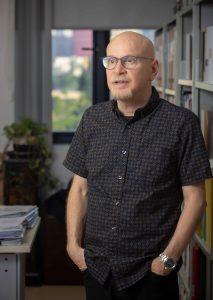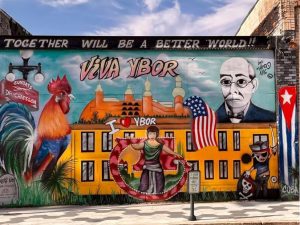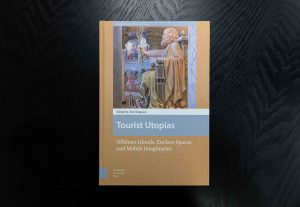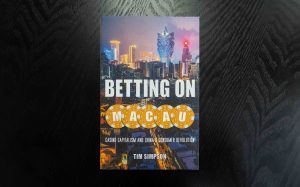Timothy (Tim) A. Simpson, associate professor in the Department of Communication at the University of Macau (UM), made a significant shift in life when he moved from the US to Macao in 2001. Although his research today is focused on urban studies in Asia, Prof Simpson’s exposure to the continent was limited before he completed his PhD studies. ‘As a kid, my only trip outside the US was a family car ride to Canada—not exactly a deep dive into another culture. However, a series of events sparked my interest in Asia, bringing me to Macao, where I’ve been able to witness its remarkable transformation first-hand,’ he says.
From Alabama to Asia
Born in Alabama, Prof Simpson once considered pursuing a career as a dentist in his youth, leading him to take pre-med classes such as chemistry and biomedical science at Auburn University. However, it was not long before he realised that that his heart was not in it, prompting a shift to business courses. Surprisingly, it was his role as a DJ at the university’s student radio station that eventually steered him toward his future career path. ‘I originally pursued dentistry and business as they seemed like the safe options, not out of any real passion,’ he reflects.
As a punk rock and hip-hop fan, Prof Simpson had numerous opportunities to write about music for the campus newspaper and engage in discussions about the latest hits with his schoolmates at the radio station. ‘I realised that music is a powerful way to express cultural values and ideas. This insight motivated me to take a lot of communication courses in the later part of my college years,’ Prof Simpson says. ‘It’s rewarding to see how my personal interests align with my scholarly pursuits. I think true passion for something can guide us toward our real aspirations.’
Following his undergraduate studies, he went on to pursue a master’s degree in communication at the University of Arkansas before undertaking his PhD studies at the University of South Florida, with the aim of pursuing an academic career. After successfully completing his doctorate, he secured a position at Ohio University. It was not long before he was assigned to teach in Bangkok for a few months as part of a partnership programme between his university and a Thai university. ‘None of my colleagues were too keen on going to Thailand, so I, as the new faculty member, was chosen. However, my knowledge of Asia was minimal—I didn’t even know where Thailand is.’
In Thailand, Prof Simpson found himself surrounded by unfamiliar food, language, and customs. On his first day, he could not find his way to the campus even with a map in hand. However, he quickly embraced the challenge and developed a deep appreciation for the vibrant culture of Bangkok. After his time in Thailand, he took on short-term teaching stints in Hong Kong for Ohio University, and travelled around the region, allowing him to further explore the diverse cultural landscapes of Asian cities. After returning to Ohio University, Prof Simpson received a promotion and tenure, recognising his dedicated service over the years and securing him a stable academic career there. Yet, in a surprising move for his colleagues and himself, he decided at that moment to move to Asia. ‘The decision was tough, but I didn’t want to stay in one small American college town for the rest of my life. I wanted to broaden my horizons and learn more about Asia.’
Exploring culture in everyday life
In 2000, Prof Simpson came across a newspaper advertisement for a position at UM, which soon brought him to Macao for an interview at the university’s old campus in Taipa. During his visit, he only had a glimpse of the Taipa traffic roundabout in front of the campus, which was not very lively. When Prof Simpson left Macao, he did not form a lasting impression of the city, especially when compared to Bangkok or Hong Kong. That recruitment also did not progress any further either. Yet, a year later, UM contacted Prof Simpson again. This time, he decided to explore the historic areas on the Macao Peninsula. The co-existence of Portuguese colonial architecture and traditional Chinese culture resonated with him, evoking memories of his time as a doctoral student back in Tampa, Florida.
‘When I first arrived at the University of South Florida in Tampa as a doctoral student, I found that the campus was encircled by highways and fast-food outlets—not exactly the neighbourhood I’d hoped to find. Luckily, I soon found Ybor City, a historic neighbourhood steeped in immigrant culture, originally populated by settlers from Cuba, Spain, Italy, and Germany.’ Prof Simpson notes that the area is distinguished by its Iberian and Latin American architectural styles. Although its once-thriving cigar industry had faded by the time he got there, the affordability of rents attracted and nurtured a vibrant community of young people and artists. This created a dynamic atmosphere filled with skateboarders and punk music enthusiasts—a place that Prof Simpson happily referred to as ‘home’.
With its rapid development, Macao also struggles to strike the right balance between promoting tourism and preserving its historical heritage, a challenge Ybor City faced as well. According to Prof Simpson, the Tampa city council and developers proposed extensive development plans aimed at attracting tourists from Disney World in nearby Orlando. However, this strategy received mixed reactions from the local residents.
To immerse himself in the life of Ybor City during its transformation, Prof Simpson became a resident and regular visitor to bookshops, CD stores, and cafés, as well as performances by indie musicians, which enabled him to establish strong ties within the community. He wove his observations and experiences into his ethnographic research, leading to a PhD thesis of over 300 pages. ‘I was both a part of the community and an observer of it. This dual role granted me a deeper understanding of cultural studies theory and the living cultural dynamics of the neighbourhood.’
Similarly, in Macao, Prof Simpson chose not to live close to the university but in the historic Rua dos Mercadores on the Macao Peninsula. ‘This street is among the oldest in Macao, once a thriving trading centre and also where Sun Yat-sen, the revolutionary, operated a pharmacy. While its prime has faded, it retains a rich collection of historical artifacts that showcase the unique blend of Chinese and Portuguese cultures in Macao. Having made my home here for over twenty years, I consider myself more of a local than an observer.’
Witnessing extraordinary evolution of Macao
‘In my view, the transformation Macao has undergone in the last twenty years is unmatched anywhere in the world, and I’ve had the fortune of witnessing it first-hand,’ says Prof Simpson. After the end of the gaming monopoly in 2002, the introduction of six new operating licenses triggered a massive wave of casino investments. Soon after, the Chinese central government began to allow mainland Chinese citizens to visit Hong Kong and Macao individually instead of just through group tours. Prof Simpson believes these developments brought about a profound transformation in Macao, particularly with the emergence of massive and luxurious integrated resorts along the reclaimed Cotai Strip, which are comparable to those found in Las Vegas.
Macao’s transformation is also evident in UM. Over the last two decades, the university has introduced a variety of new departments, faculties, and programmes. Moreover, it has relocated its campus from a hill in Taipa to a significantly larger space on Hengqin Island. Shortly after joining the university, Prof Simpson played a key role in establishing UM’s Department of Communication. He served as the founding head from 2004 to 2008. Subsequently, he became the associate dean of the Faculty of Social Sciences , where he was involved in launching several postgraduate programmes. Today, he continues to research and lecture on culture, visual communication, and consumer architectures like those found in Macao.
Prof Simpson’s interest in studying Macao was sparked by his daily experience at UM. As he walked up the hill to the old Taipa campus, he saw a large group of Chinese tourists enthusiastically photographing the Greek mythology statues in front of the hotel next to the university. It was this moment that stirred up his interest in tourist behaviours, consumption patterns, and the socio-cultural dynamics of Macao. ‘Starting from scratch, I slowly learned about the history and culture of Macao, including its gambling scene. It was only after a decade that I felt confident enough to claim that I was studying Macao,’ he says.
In 2016, Prof Simpson’s edited volume Tourist Utopias: Offshore Islands, Enclave Spaces, and Mobile Imaginaries was published by Amsterdam University Press. The book, co-authored with fellow scholars, examines Macao and other cities as global ‘tourist utopias’. Appropriately, the cover of the book showcases the statues of Greek mythological figures at the Taipa hotel that first drew his attention.
Observing mainland China’s consumer society in Cotai
In 2023, Prof Simpson’s latest book Betting on Macao: Casino Capitalism and China’s Consumer Revolution was published by the University of Minnesota Press. The book delves into Macao’s recent transformation into the world’s top gaming destination and the city’s pivotal role in China’s emergence as the largest consumer society on the planet.
Part of Prof Simpson’s research involves comparing the Cotai Strip in Macao with the Las Vegas Strip, highlighting the distinct consumption behaviours between tourists in the two gaming hubs. ‘Visitors in Las Vegas tend to stroll leisurely along the Strip, taking in the architecture, street performances, and parades, often becoming a part of the spectacle themselves,’ he says. ‘On the Cotai Strip, despite the presence of similarly grand buildings, the main attraction for visitors is the casinos.’ He also notes that even within casinos, gaming behaviours differ significantly. While slot machines are the most popular in Las Vegas, in Macao, baccarat, which blends strategy and luck, is the game of choice.
Prof Simpson further suggests that, over the past few decades, mainland China has undergone significant urbanisation and the emergence of a consumer society, where the role of individuals as consumers has become increasingly crucial for the domestic economy. ‘Macao’s urban landscape and economy have been deeply transformed by the influx of capital and tourists, offering a lens through which to examine the rise of consumer revolution across mainland China,’ he says.
Genuine passion leading to fulfilling life
From Alabama to Asia, and from being a newcomer in Macao to a local scholar, Prof Simpson views his journey as driven by his true passions. He shares these experiences with his students, offering them valuable advice and encouraging them to follow their genuine interests instead of merely following popular research topics. ‘It’s true that today’s postgraduates face more pressure than in my time. They are naturally more strategic in selecting their topics to maximise their chances for academic careers. But from my experience, I still believe that true passion ultimately leads to a fulfilling life.’
Chinese & English Text: Davis Ip, UM Reporter Zhang Jiahe
Photo: Jack Ho, with some provided by the interviewee
Source: My UM ISSUE 128




